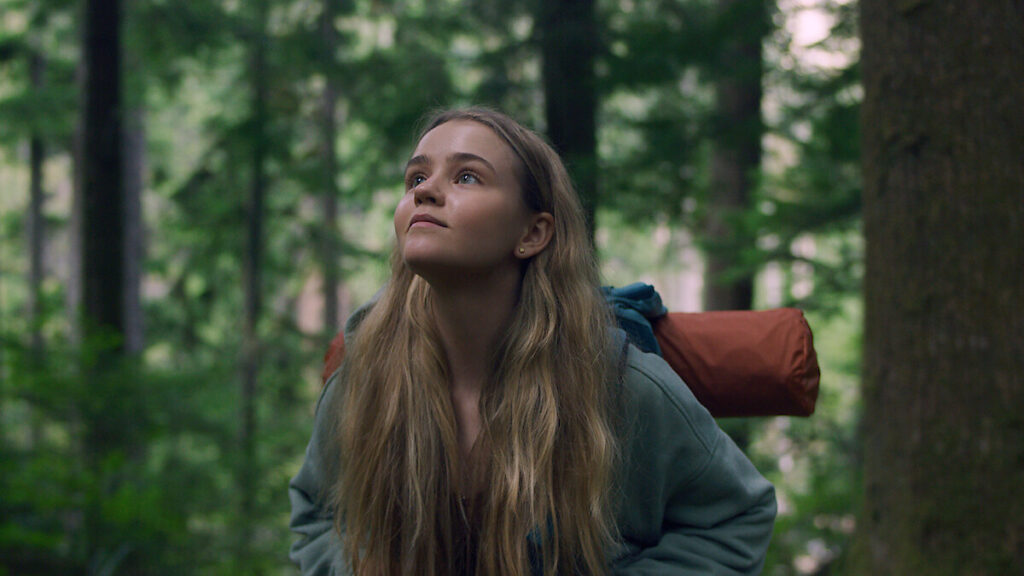The world of television is constantly evolving, but few series manage to capture the essence of youth and self-discovery like Penelope (2024). Premiering on Netflix on September 24, 2024, this innovative series, created by Mark Duplass and Mel Eslyn, not only showcases stellar performances but also presents a poignant narrative that resonates deeply with viewers. With its captivating visuals and immersive storytelling, Penelope stands out as a must-watch show, especially for those who seek both adventure and introspection.
The Creative Vision Behind Penelope
Produced by Duplass Brothers Productions, known for hits like Somebody Somewhere and Room 104, Penelope is an eight-part indie drama that premiered at the 2024 Sundance Film Festival. The series follows a 16-year-old girl named Penelope, played by Megan Stott, who feels increasingly alienated in a fast-paced, modern society. The show begins with Penelope’s decision to leave her conventional life behind and embark on a journey into the unknown wilderness of the Pacific Northwest.
The creators, Duplass and Eslyn, have crafted a narrative that goes beyond traditional storytelling. Each episode is rich with emotional depth, inviting viewers to explore themes of identity, self-discovery, and the human connection to nature. The production team’s meticulous attention to detail, from the vibrant cinematography to the haunting soundtrack, ensures that Penelope is not just a show to watch but an experience to be felt.
An Engaging Plot That Reflects Modern Struggles
From the moment we meet Penelope, we’re drawn into her world. Struggling with her sense of belonging, she finds herself in a moment of transcendence, dancing with friends in the woods, surrounded by music yet feeling profoundly alone. This juxtaposition captures the essence of modern adolescence, highlighting the loneliness that can accompany social interactions.
Penelope’s story unfolds when she receives a text from her mother, insisting she return home for SAT preparation. Instead, Penelope decides to take a leap of faith, purchasing outdoor gear and embarking on a train journey towards Cascade National Forest. Her farewell message to her parents is both heartbreaking and liberating: “It’s not you; I’m not running away. I feel like I’m running towards something.” This moment sets the stage for her transformative journey.
Themes of Survival and Self-Discovery

As Penelope navigates the wilderness, she faces numerous challenges that test her resilience and survival skills. With no formal training, she relies on instinct and a survival guide, learning to build shelters and find food. These experiences are not merely physical; they symbolize her psychological journey toward self-acceptance and empowerment.
Throughout the series, Penelope encounters various characters, including a soulful activist played by Krisha Fairchild, who introduces her to the concept of inherited trauma. This dialogue adds depth to the narrative, encouraging viewers to reflect on their histories and the emotional burdens they carry.
The Visual Aesthetic of Penelope
One of the standout features of Penelope is its stunning visual storytelling. The cinematography captures the breathtaking beauty of the natural world, using patient shots that linger on lush landscapes, from towering trees to serene lakes. The immersive soundscape—filled with birdsong and the rustling of leaves—further enhances the viewer’s connection to Penelope’s journey.
The series opts for a poetic approach, moving away from conventional narrative structures. By focusing on Penelope’s point of view, the audience experiences her triumphs and struggles firsthand, fostering a deep emotional connection. This technique is a refreshing departure from the often formulaic plots of mainstream television.
Critical Acclaim and Audience Reception
Since its debut, Penelope has garnered praise from critics and audiences alike. Judy Berman of TIME described it as “like nothing else on television,” highlighting its unique narrative style and rich character development. The series has sparked discussions about the portrayal of teenage girls in media, emphasizing the importance of presenting them as complex individuals rather than mere stereotypes.
Viewers have resonated with Penelope’s story, finding solace in her struggles and triumphs. The show’s exploration of mental health and emotional well-being has struck a chord with many, making it a timely addition to the television landscape.
Comparison of Literary and Cinematic Influences
Penelope draws parallels to classic literature and contemporary narratives, echoing themes found in works like Into the Wild and Wild. While these stories often culminate in definitive endings, Penelope maintains an open conclusion, allowing viewers to reflect on the journey rather than the destination. This narrative choice invites audiences to contemplate their life journeys and the significance of personal growth.
The series also shares connections with the tale of Homer’s Penelope, who embodies fidelity and resilience. In a modern twist, this new Penelope navigates her odyssey of self-discovery, showcasing the timelessness of these themes across generations.
Conclusion
Penelope (2024) is a remarkable series that captures the essence of youth, exploration, and self-discovery. With its rich storytelling, stunning visuals, and compelling performances, it sets a new standard for coming-of-age dramas. As viewers follow Penelope’s journey through the wilderness, they are encouraged to reflect on their paths, embracing the beauty and complexity of life.
In an era where television often falls into predictable patterns, Penelope emerges as a refreshing and thought-provoking narrative that deserves to be celebrated. For anyone seeking a show that is not only entertaining but also deeply resonant, Penelope is a journey worth taking.
FAQs
1. Where can I watch Penelope?
Penelope is available for streaming on Netflix, with all eight episodes now live.
2. Who are the main creators of Penelope?
The series was created by Mark Duplass and Mel Eslyn, known for their innovative storytelling in the indie film and television landscape.
3. What themes does Penelope explore?
Penelope delves into themes of self-discovery, survival, and the complexities of modern adolescence.
4. Is Penelope based on any literary works?
While Penelope is an original creation, it draws inspiration from classic narratives about journeys of self-discovery and survival, including influences from Into the Wild.
5. What can viewers expect from the visual style of Penelope?
The series is noted for its stunning cinematography and immersive sound design, which create a rich, atmospheric experience that enhances the storytelling.

